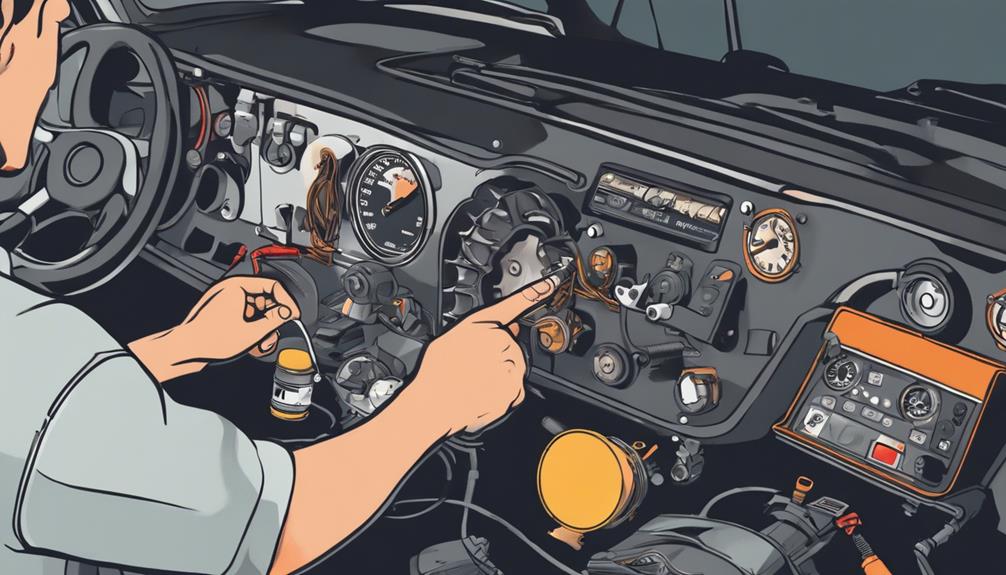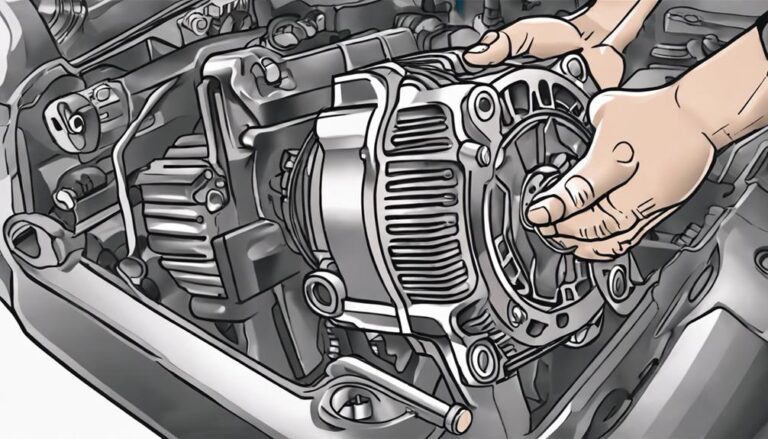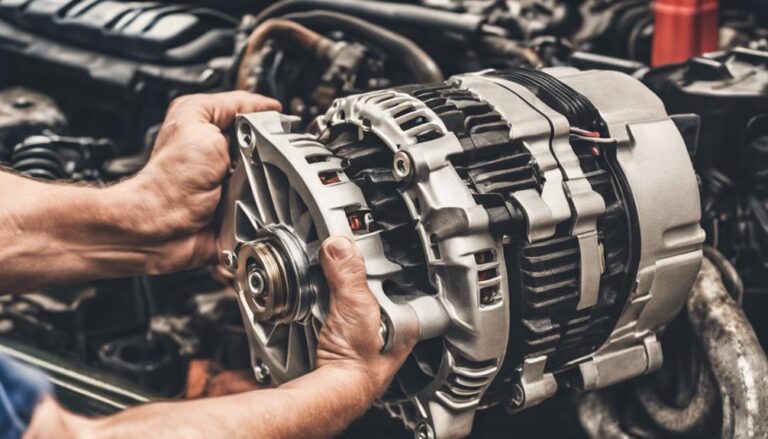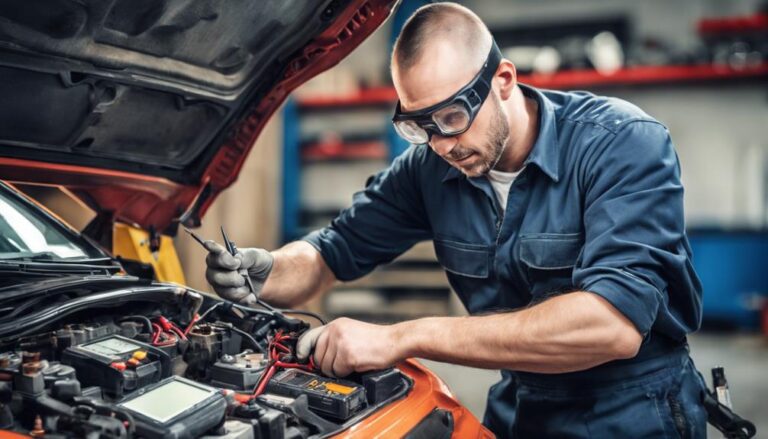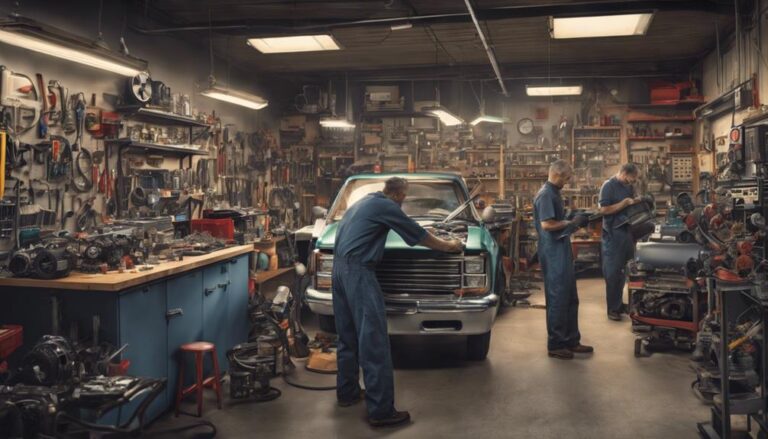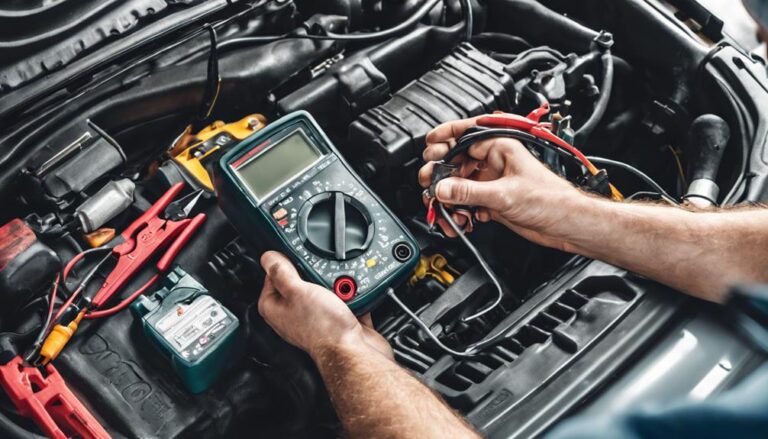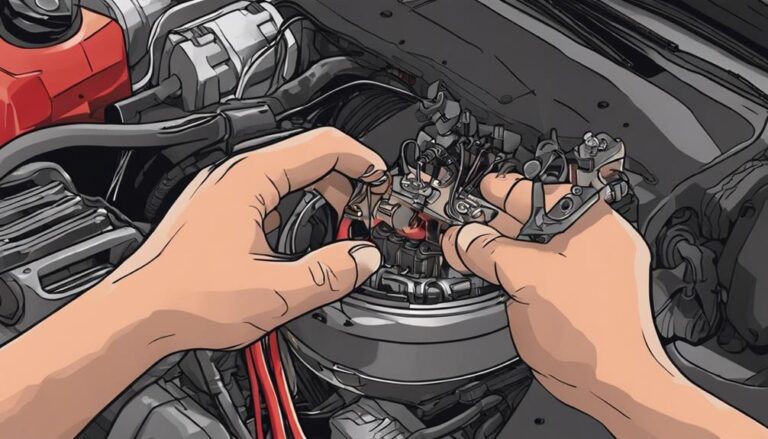10 Signs of Alternator Failure and Repair Options
Are you noticing strange noises or smells from your vehicle lately? Your alternator might be trying to tell you something important. Understanding the signs of alternator failure could save you from unexpected breakdowns and costly repairs down the road.
By learning to recognize these indicators early on, you can take proactive steps to address any issues before they escalate. Stay tuned to discover the full list of warning signs and explore effective repair options to keep your vehicle running smoothly.
Key Takeaways
- Dim or flickering lights signal alternator issues, impacting safety.
- Dead battery or frequent jump starts indicate potential alternator failure.
- Slow accessories and unusual odors may point to alternator trouble.
- Choose between repair, replacement, remanufactured, or rebuilding options carefully.
Dim or Bright Lights
If you notice dim or overly bright lights in your vehicle, it could be a sign of inconsistent voltage to the electronic accessories, potentially indicating alternator malfunction. Flickering lights or erratic brightness changes are key indicators of issues that could affect headlight operation.
The alternator plays an important role in guaranteeing a stable power supply to the vehicle's electronic systems. Dim lights suggest a lack of power reaching the headlights, while overly bright lights may signal an overcharging problem. These inconsistencies not only impact visibility but also pose safety risks while driving.
To address these concerns, it's essential to monitor the performance of your vehicle's lights closely. If you observe any abnormalities such as flickering lights or erratic changes in brightness, it's recommended to have the alternator inspected promptly.
Dead Battery
If your car battery frequently drains or requires jumpstarting, it could be a sign of alternator issues causing improper charging.
Jumpstarting can help determine if the problem lies with the battery or the alternator, aiding in diagnosing the root cause of the dead battery.
Keep an eye out for these signs to address any potential alternator malfunction promptly.
Battery Drain
Experiencing a dead battery can often signal potential alternator failure, indicating a possible issue with the charging system. A dead battery, resulting from battery drain, can be caused by alternator problems that prevent the battery from receiving a proper charge. Symptoms such as slow windows, malfunctioning seat warmers, or erratic instrument panel behavior can point to insufficient power due to a failing alternator.
Jumpstarting the car can be a temporary solution to determine if the issue lies with the battery or the alternator. If the battery depletes rapidly or the car dies shortly after a jumpstart, it may confirm alternator problems. Addressing these signs promptly can prevent further damage to the vehicle's electrical system.
Jump Start
Jump-starting a vehicle with a dead battery provides a temporary solution that can mask underlying alternator issues but shouldn't be relied upon as a long-term fix. When facing starting problems due to a dead battery, it's essential to evaluate potential alternator failure.
A dead battery could be a symptom of charging issues caused by a failing alternator. Repeated jump starts might indicate an underlying problem with the alternator's ability to charge the battery adequately.
If your car stalls shortly after a jump start, it could be a sign of an alternator unable to sustain power. To diagnose the root cause of starting or stalling problems, testing the battery and alternator is crucial.
Slow Accessories
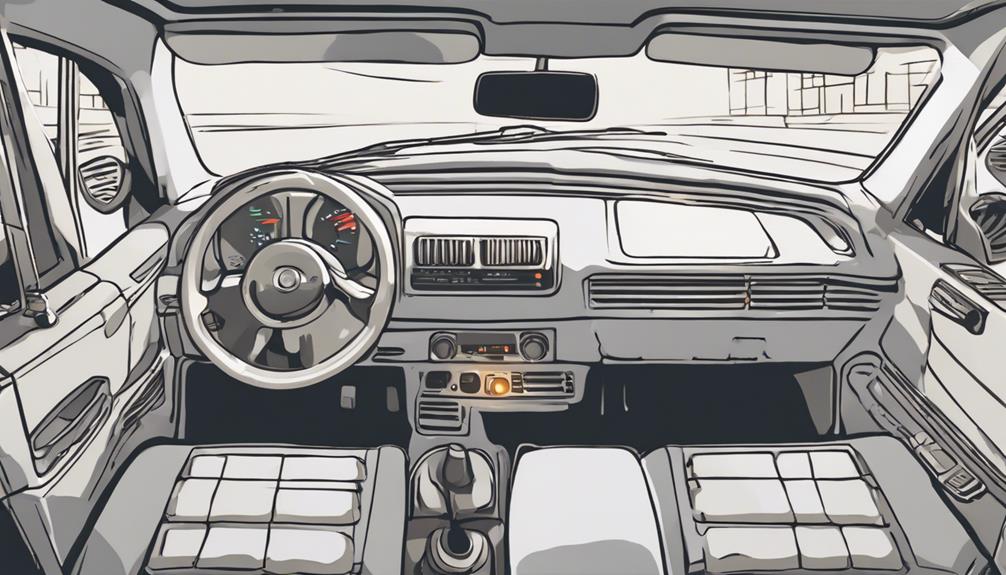
When observing slow accessories in your vehicle, such as windows that roll up or down sluggishly, it may indicate insufficient power from the alternator. This issue can manifest in various ways, affecting different electronic features within your car.
Here are some signs that slow accessories could be linked to alternator problems:
- Malfunctioning Electronic Features: If you notice your seat warmers not working correctly or a delayed response from other electronic features, the alternator may not be providing adequate power.
- Erratically Behaving Instruments: A speedometer or other dashboard instruments behaving erratically could be a result of the alternator not supplying enough power to these components.
- Dim or Flickering Lights: Dim or flickering lights in your vehicle are often a clear indicator of the alternator failing to deliver consistent power to the electrical system.
- Trouble Starting: Difficulty starting your car or frequent stalling might be caused by alternator malfunction, leading to insufficient power reaching the engine components.
Addressing slow accessories promptly can help prevent further damage to your vehicle's electrical system.
Trouble Starting
If you're experiencing trouble starting your vehicle, it could be a sign of alternator issues.
A clicking noise when you try to start the engine is a common indicator of a failing alternator.
Insufficient power reaching the spark plugs can lead to difficulties starting your car consistently.
Starting Issues
Experiencing difficulty initiating your vehicle could indicate a potential alternator issue, particularly if the engine struggles to start smoothly. When dealing with starting issues related to alternator failure, consider the following:
- Battery Not Charging: An alternator that fails to charge the battery properly can lead to starting troubles.
- Insufficient Power: Clicking sounds upon starting may signal the alternator not providing enough power to the engine.
- Spark Plug Issues: Failing alternators may not supply adequate power to the spark plugs, causing starting problems.
- Frequent Stalling: If your engine frequently stalls, the alternator may not be charging the battery adequately.
Addressing starting issues promptly is vital to prevent further damage caused by alternator malfunction.
Repair Solutions
To address trouble starting your vehicle due to a failing alternator, consider professional repair solutions to guarantee performance and reliability. One common problem with the alternator is that it fails to charge the battery adequately, leading to difficulties in starting the vehicle. Signs your alternator is failing, like a clicking sound when starting the engine, can point to this issue. When the alternator begins to fail, spark plugs may not receive sufficient power, causing starting problems. If your vehicle is running but stalling frequently, it could be due to the alternator not charging the battery correctly. Seeking alternator repair from a qualified technician is essential to ensure your vehicle functions at its best.
| Repair Solution | Description |
|---|---|
| Alternator Testing and Diagnostics | Professional inspection to identify issues with the alternator and determine the best repair approach. |
| Alternator Replacement | Installing a new alternator to ensure proper charging of the battery and reliable vehicle operation. |
| Battery Check and Replacement | Checking the battery's condition and replacing it if necessary to complement the alternator repair. |
Growling Noises
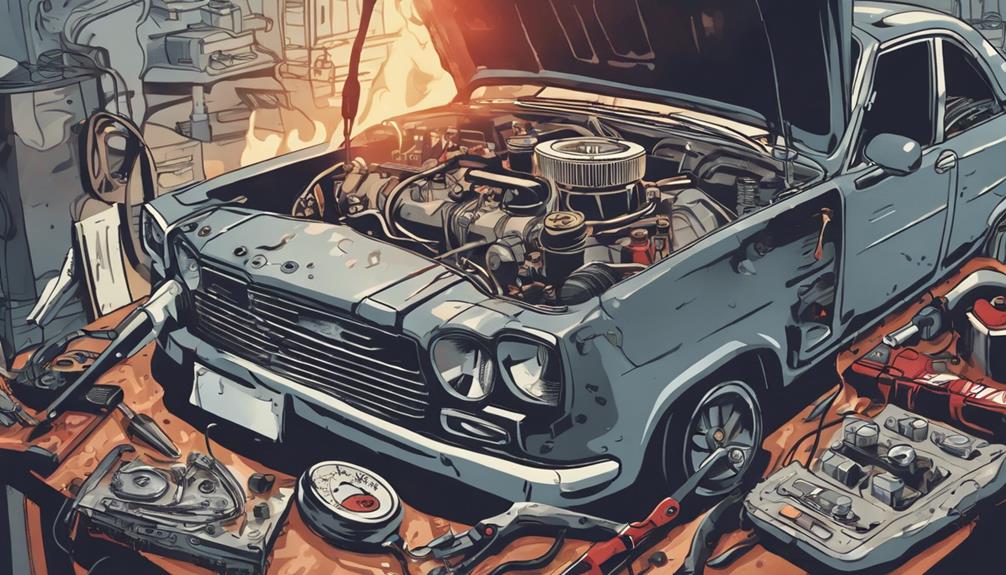
Growling noises emanating from under the hood of your vehicle may indicate belt misalignment or bearing issues associated with the alternator. If you notice these sounds, it's essential to address the problem promptly to prevent further damage.
Here are some key points to think about:
- Belt Misalignment: Misaligned belts can rub against pulleys, creating growling noises in the engine bay. This friction can lead to premature wear and potential damage to the alternator system.
- Bearing Problems: Bearings within the alternator spinning on the rotor shaft may be failing, causing growling sounds. Ignoring these noises can result in complete bearing failure and significant alternator issues.
- Professional Inspection: Growling noises are a clear sign of potential alternator problems that require a professional inspection. A qualified mechanic can diagnose the issue accurately and recommend the necessary repairs.
- Preventive Action: Addressing growling noises promptly through professional inspection can help prevent costly repairs and ensure the best functioning of your vehicle's alternator system.
Burning Smell
If you notice a burning smell coming from your vehicle's engine bay, it could be a sign of alternator trouble. This odor may stem from worn-out parts or a strained alternator belt causing friction.
To address this issue, potential causes must be identified and repair solutions considered for best functionality.
Unusual Odors Indicating Trouble
A noticeable burning smell in the engine bay often serves as a key indicator of potential alternator issues. Here are some reasons why you might be detecting this smell:
- Parts wearing out within the alternator can produce a burning odor.
- The tension and friction on the alternator belt can cause a distinct burning smell.
- An overworked alternator may emit a burning odor due to excessive strain on its components.
- Damaged wires connected to the alternator can lead to an electrical fire smell.
If you notice any of these signs, it's crucial to address the issue promptly to prevent further damage to your vehicle's electrical system.
Potential Causes of Burning Smell
When detecting a burning smell in your vehicle, it's important to identify the potential causes related to the alternator system to address the issue promptly and prevent further damage.
A burning odor can indicate alternator parts wearing out due to tension and friction. Overworked alternators struggling to function correctly may emit a burning smell.
Damaged wires within the alternator system could lead to an electrical fire smell, signaling underlying issues. Additionally, resistance in the flow of electricity within the alternator can also result in a burning odor.
Promptly addressing any burning smell in your car related to these alternator issues is critical to avoid more significant damage and make sure the safety and proper functioning of your vehicle.
Repair Solutions Available
To address a burning smell related to your alternator system, consider the available repair solutions to resolve potential issues promptly and effectively. When faced with a burning smell emanating from your alternator, it's important to act promptly. Here are some repair solutions to address the issue:
- Inspect and Replace Worn Out Parts: Check for any worn-out alternator components, such as bearings or brushes, and replace them promptly.
- Adjust Belt Tension: Make sure the alternator belt is correctly tensioned to prevent excess friction that can lead to a burning odor.
- Address Electrical Fire Risks: Examine wires for damage that may cause electrical fires and replace or repair them as needed.
- Check and Resolve Electrical Resistance: Identify and rectify any resistance in the electrical flow within the alternator system to eliminate burning smells.
Battery Warning Light
If the battery warning light on your dashboard illuminates, it signals a potential alternator issue that requires immediate attention. This warning light indicates that the alternator voltage may be dropping below the necessary capacity, possibly leading to a malfunction. In some cases, the light may flicker in conjunction with fluctuating alternator voltage, which is a clear sign of a problem. It's a critical indicator that the alternator may be exceeding its voltage limit, putting your vehicle at risk of stalling or not starting.
When faced with the battery warning light, it's advisable to seek a professional alternator inspection promptly. Ignoring this warning can result in further damage to your vehicle's electrical system and leave you stranded unexpectedly. By addressing the issue early on, you can prevent more severe alternator problems and make certain the reliable operation of your vehicle. Remember, your safety on the road is paramount, so don't hesitate to address any potential alternator problems indicated by the battery warning light.
Repair Options
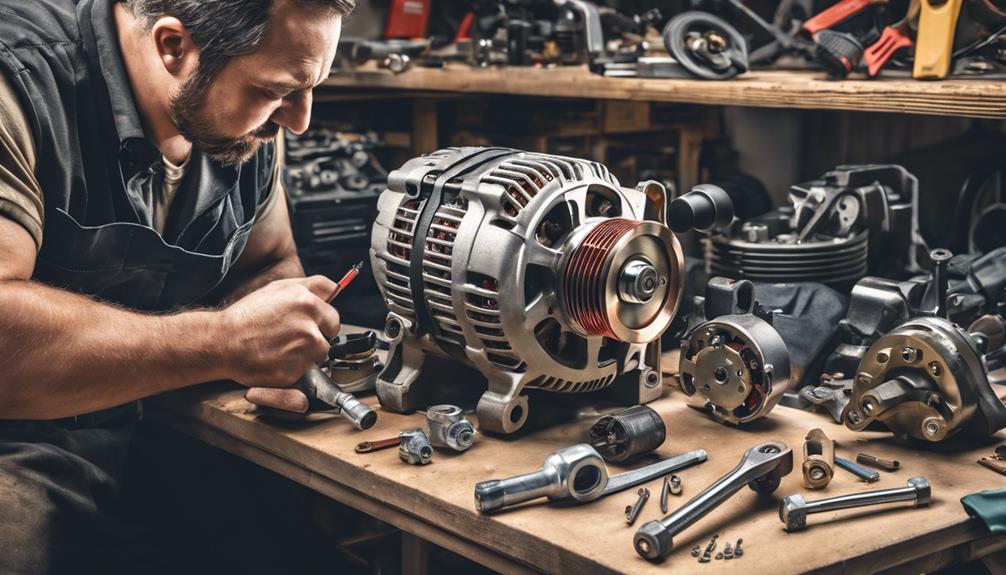
Upon noticing signs of alternator failure like the battery warning light, exploring various repair options becomes important to ensuring the best performance of your vehicle. When faced with alternator issues, contemplate the following options:
- Alternator Repair: You can opt to repair the existing alternator through professional testing, diagnosing, and fixing of specific problems.
- New Unit Installation: Installing a brand-new alternator guarantees top performance and reliability, although it may be the most expensive option.
- Remanufactured Unit: A remanufactured alternator offers a more cost-effective solution compared to a new unit while still providing reliability and functionality.
- Rebuilding Services: Some repair shops provide alternator rebuilding services, which can extend the life of your current alternator and potentially save costs in the long run.
Each repair option varies cost and effectiveness, so it's crucial to contemplate your budget and the extent of damage before making a decision.
Maintenance Tips
Wondering how to guarantee peak performance and longevity of your alternator? To make sure your alternator operates at its best, there are essential maintenance tips you should follow. Regularly inspect the alternator belt for any signs of wear and tear. A worn-out belt can lead to issues with the charging system, affecting the alternator's performance. Keeping the electrical system clean and free of debris is key for peak performance. Test the alternator periodically to confirm it's functioning correctly and producing the required electrical output.
Maintaining proper tension on the alternator belt is vital to preventing slippage, ensuring that power is efficiently transferred. Address any electrical issues promptly to avoid putting unnecessary strain on the alternator. By adhering to these maintenance practices, you can enhance the lifespan of your alternator and keep your vehicle's electrical system operating smoothly. Remember, proactive maintenance is the key to preventing alternator failures and ensuring your vehicle's peak performance.
Professional Service
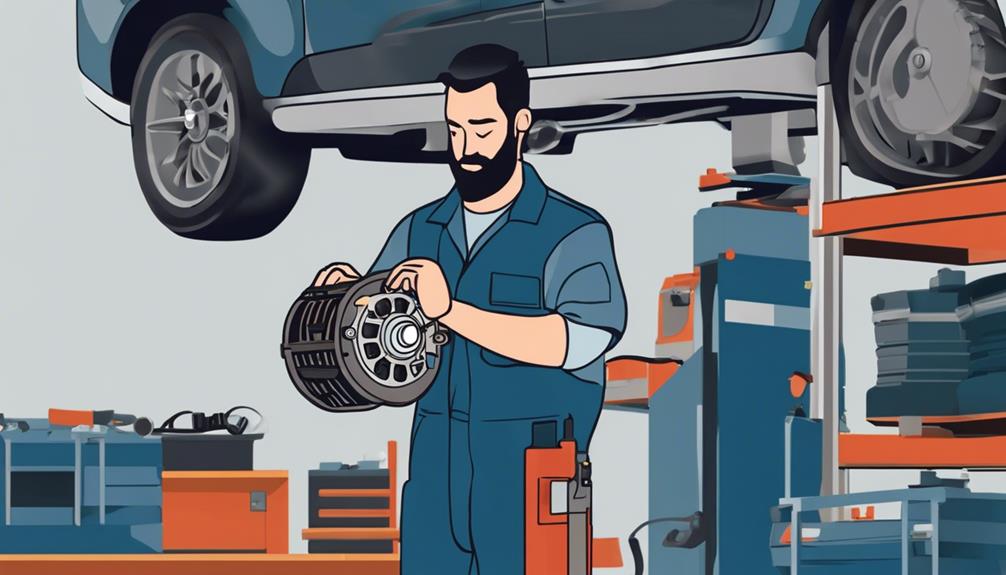
For professional alternator service that guarantees peak performance, thorough inspections by skilled mechanics are essential to accurately diagnose any issues. When opting for professional alternator service, here's what you can expect:
- Thorough Inspections: Skilled mechanics conduct detailed examinations to pinpoint any underlying problems within the alternator system.
- Quality Parts Replacements: Professional alternator repairs involve using high-quality parts to ensure peak performance and longevity.
- Expertise of Skilled Mechanics: Trained professionals with expertise in alternator systems handle the repair process efficiently and effectively.
- Competitive Pricing: Professional service centers often offer competitive pricing options to cater to various budgets, making quality alternator service accessible to all.
Frequently Asked Questions
Can You Fix a Bad Alternator?
You can fix a bad alternator yourself, but it's important to have the right tools and know-how. DIY repair can save money, but for best results and safety, professional help is recommended for efficient troubleshooting and replacement.
What Is the Best Way to Tell if Your Alternator Is Bad?
To determine if your alternator is bad, watch for warning lights on your dashboard, strange noises from under the hood, dim lights, a dead battery, a burning smell, or electrical issues. These signs indicate potential alternator problems.
How Does a Car Act When the Alternator Is Going Out?
When your alternator is going out, your car may act like a flickering light, showing warning signs with dimming dashboard lights, strange noises under the hood, and electrical issues like slow windows. Battery problems and engine stalling could follow.
Can an Alternator Be Bad and Still Work?
Yes, an alternator can be bad and still work to some extent, providing limited power. Hidden symptoms may include dim lights or slow accessories. While temporary fixes like jump-starting exist, continued use can lead to costly electrical damage.
Conclusion
So, keep an eye out for these 10 signs of alternator failure to make sure your vehicle stays running smoothly. Don't wait until you're stuck on the side of the road with a dead battery!
Remember, addressing these issues promptly can save you time and money in the long run. Just like changing the oil in your car regularly keeps the engine running smoothly, taking care of your alternator will keep your vehicle in top shape.
Drive safe!

